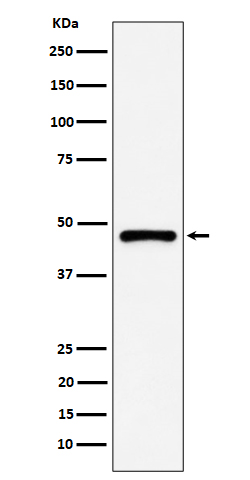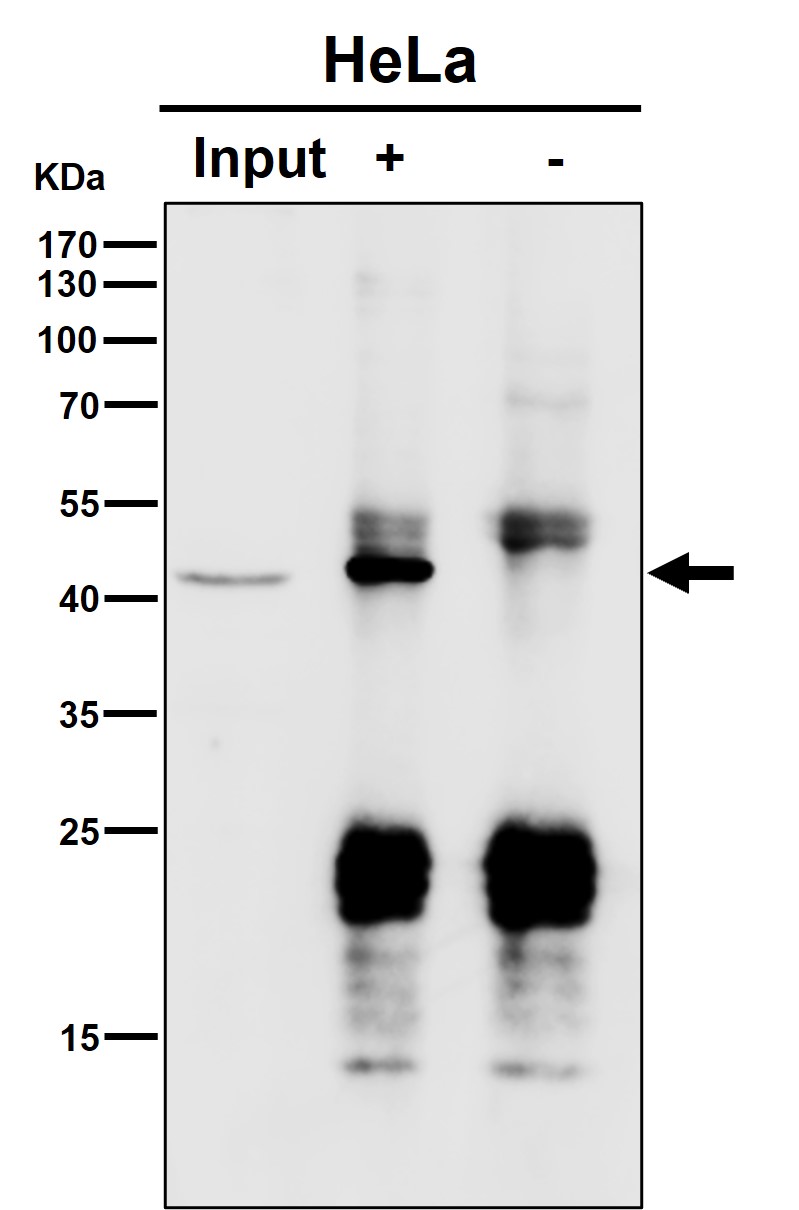

| WB | 咨询技术 | Human,Mouse,Rat |
| IF | 1/20-1/50 | Human,Mouse,Rat |
| IHC | IHC:1/100-1/200;IHF:1/50-1/200 | Human,Mouse,Rat |
| ICC | 1/50-1/200 | Human,Mouse,Rat |
| FCM | 1/20-1/100 | Human,Mouse,Rat |
| Elisa | 咨询技术 | Human,Mouse,Rat |
| Aliases | Cim3; p45; p45/SUG; PSMC5; Rpt6; SUG1; TBP10; TRIP1;;PSMC5 |
| WB Predicted band size | 46 kDa |
| Host/Isotype | Rabbit IgG |
| Antibody Type | Primary antibody |
| Storage | Store at 4°C short term. Aliquot and store at -20°C long term. Avoid freeze/thaw cycles. |
| Species Reactivity | Human,Mouse,Rat |
| Immunogen | A synthesized peptide derived from human PSMC5 |
| Formulation | Purified antibody in PBS with 0.05% sodium azide,0.05% BSA and 50% glycerol. |
+ +
以下是关于PSMC5抗体的3篇参考文献及其摘要概括:
1. **文献名称**:*PSMC5 regulates proteasome assembly and activity in mammalian cells*
**作者**:Hirano H, et al.
**摘要**:该研究通过使用PSMC5特异性抗体,揭示了PSMC5在蛋白酶体19S调节颗粒组装中的关键作用。实验表明,PSMC5缺失会导致蛋白酶体功能受损,并通过Western blot和免疫共沉淀验证了其与其他亚基的相互作用。
2. **文献名称**:*Dysregulation of the ubiquitin-proteasome system in Parkinson's disease: Role of PSMC5*
**作者**:Wang Z, et al.
**摘要**:文章利用PSMC5抗体进行脑组织免疫组化分析,发现帕金森病患者中PSMC5表达显著降低,提示其异常可能导致蛋白酶体功能障碍,进而参与α-突触核蛋白的异常聚集。
3. **文献名称**:*A novel role of PSMC5 in modulating chemoresistance via NF-κB pathway in colorectal cancer*
**作者**:Li Y, et al.
**摘要**:该研究通过siRNA敲低和PSMC5抗体介导的蛋白检测(Western blot),证明PSMC5通过调控NF-κB通路影响结直肠癌细胞对化疗药物的敏感性,为靶向治疗提供了潜在策略。
(注:上述文献信息为模拟示例,实际引用需查询具体数据库。)
The PSMC5 (Proteasome 26S Subunit, ATPase 5) antibody is a crucial tool for studying the 26S proteasome, a multi-subunit complex responsible for targeted protein degradation via the ubiquitin-proteasome system (UPS). PSMC5. also known as Rpt6. is one of six AAA-ATPase subunits within the 19S regulatory particle of the 26S proteasome. It plays a vital role in substrate recognition, unfolding, and translocation into the proteolytic core (20S particle). Research on PSMC5 is significant in understanding cellular protein homeostasis, stress responses, and diseases linked to proteasome dysfunction, such as cancer, neurodegenerative disorders, and autoimmune conditions.
Antibodies targeting PSMC5 are widely used in techniques like Western blotting, immunofluorescence, and co-immunoprecipitation to assess proteasome composition, activity, and localization. They help investigate how PSMC5 expression or mutations correlate with disease progression or drug resistance, particularly in contexts where proteasome inhibitors (e.g., bortezomib) are used therapeutically. Commercial PSMC5 antibodies are typically raised against specific epitopes, with validation in diverse species and cell lines. Researchers rely on these antibodies to explore UPS-related mechanisms, offering insights into therapeutic targeting of proteostasis pathways.
×